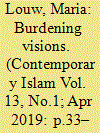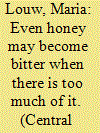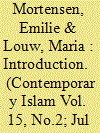| Srl | Item |
| 1 |
ID:
164021


|
|
|
|
|
| Summary/Abstract |
Taking an ethnographic point of departure in the relationship between two women in Bishkek, the capital of Kyrgyzstan – a doctor and a clairvoyant – the article will focus on the ambiguous ways the visible and the invisible intersect in the lives of the Kyrgyz. Esoteric experiences such as ayan, dream omens, sometimes stand out as flashes of insight which bring clarity and guidance, but are equally often unwanted disturbances which haunt people against their will. In order to do justice to this ambiguity I engage the phenomenology of the alien as developed by Bernhard Waldenfels, arguing that esoteric experiences may be seen as an example of what he terms radical alienness which cast doubt on interpretation itself.
|
|
|
|
|
|
|
|
|
|
|
|
|
|
|
|
| 2 |
ID:
126042


|
|
|
|
|
| Publication |
2013.
|
| Summary/Abstract |
In Kyrgyzstan, as in the rest of Central Asia, recent decades have witnessed a proliferation of distinctions between 'good' and 'bad' Islam. What is perceived as a growing 'religiosity' is often seen as a symptom of post-Soviet chaos and excess, but people equally tend to see Islam as an important source of well-being, for themselves and for society as such. It is argued that a general feature of the Islam many Muslims strive for - and occasionally experience glimpses of - is one that expresses, embodies and enables a balanced existence: a balance between well-being in this world and in the afterlife; a balance between the acceptance of one's fate and the attempt to improve one's situation; or a balance between adherence to abstract dogmas and respect for local moralities.
|
|
|
|
|
|
|
|
|
|
|
|
|
|
|
|
| 3 |
ID:
179997


|
|
|
|
|
| Summary/Abstract |
What do we, as human beings—religious, non-religious, Muslim and non-Muslim—care about, and how do experiences of caring and being cared for come to shape the way we lead our lives with and among others? In this special issue, we set out to explore the relations between Muslims and various religious and non-religious others through the concept of ‘care’. Doing this, we dwell specifically on what we describe as tensions in care relations and the way they are experienced, thought of, conceptualized and negotiated: 1) tensions between individual aspirations and care for others 2) tensions between care as duty and care as pleasure and ground for human flourishing 3) tensions between practical and emotional dimensions of care 4) tensions between universal and cultural or ideological aspects of care and 5) tensions between state projects of care and religiously motivated care practices.
|
|
|
|
|
|
|
|
|
|
|
|
|
|
|
|
| 4 |
ID:
076014


|
|
|
| 5 |
ID:
131478


|
|
|
|
|
| Publication |
2014.
|
| Summary/Abstract |
In the first decade or so after the breaking up of the Soviet Union and the independence of the Central Asian states there was an explosion in literature dealing with Islam in the region. Very little of it, however, was based on extensive fieldwork. Furthermore, most of these studies tended to be guided by security and geopolitical concerns and mainly focused on the question of whether there was a risk that militant or radical Islam might gain a foothold in the region. People's everyday religious practice and experiences and their ideas about Islam, on the other hand, were very much neglected.
|
|
|
|
|
|
|
|
|
|
|
|
|
|
|
|